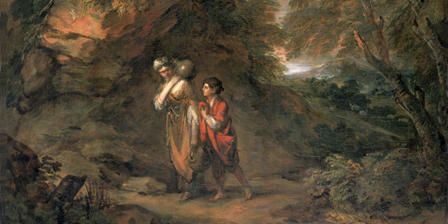When thinking about the importance of motherhood in the Bible, many readers can name a few women who mothered prominent sons throughout Israelite and Jewish history. Women like Mary or Sarah, whose stories are well-known in Sunday school classes and Bible studies. But what about the mothers no one notices? The mothers who make great sacrifices for their children, but who drop off our biblical radar?
Hagar is one of these mothers. Her experience as a mother is vital to the Genesis narrative as she engages in motherhood through the messy covenantal promise God made with Abraham through Sarah for the future of Israel. Hagar’s narrative begins with a tragic and violent story, as Sarah’s desperation to produce a child in fulfillment of God’s covenant leads her to convince Abraham to rape Hagar. (I use the word “rape” here because, as Sarah and Abraham’s slave, how could Hagar have possibly denied consent?)

Mallory Challis
Her suffering, as she is forced into surrogacy, beaten and rejected, and subjected to near-death experiences throughout the duration of her narrative, juxtaposes the classic Christian view of what it means to be a biblical mother. Many of us view biblical motherhood as a conglomeration of the kind, sweet and loving sacrifices many women make for their children. However, this is not a reflection of everything motherhood entails. Hagar’s relentless suffering for the sake and survival of her child is pivotal in our understanding of the divinity of motherhood.
Unlike other mothers in the Bible, Hagar does not choose motherhood as she is preparing for marriage and longing to raise children. She does not choose motherhood when she conceives her child, Ishmael. Instead, she chooses to be a mother after her child is born, as they are placed face-to-face with death in the desert.
At this moment when Hagar chooses motherhood, she is consenting to the most difficult choice she could have made. For Ishmael to survive and be blessed by God in his future, Hagar returns to her abusive owner’s household. She, in a moment when she can choose to relinquish her pain and suffering to death, returns to slavery because of a promise from God that her son will be OK. She selflessly chooses life knowing she will suffer so that one day Ishmael may not. This is divine motherhood.
Hagar’s narrative embodies what it means to suffer for the Lord. She represents all mothers who do not fit into the traditional narrative of motherhood: single mothers, motherhood that results from sexual trauma, mothers who make extensive sacrifices for their children, and mothers who feel like they are not enough but still bring themselves to parent their children each and every day.
“She represents all mothers who do not fit into the traditional narrative of motherhood.”
Mothers everywhere make unimaginable sacrifices each day that go unnoticed, just as Hagar’s sacrifices are brushed away as her presence in the biblical narrative fades after her return to slavery. Her relentlessly humble strength is an anthem for mothers everywhere.
But as we look to her story as an example of the divine struggles of motherhood, let us not forget that she is the first person to name God.
“El-roi”: the God who sees. I believe Hagar chooses this name for God intentionally. God saw her in the desert as she suffered, edging death, having suffered abuse and shame in slavery. God saw her as she pondered the reality that death may be painful yet peaceful as she and Ishmael dehydrated alone. God saw her as she continued to mother her only son, given to her by force without her consent, as she suffered unimaginably for her own survival.
“God saw her as she continued to mother her only son, given to her by force without her consent.”
And just as God saw Hagar in her insufferable effort to continuously choose motherhood, God sees every mother’s daily sacrifices for their children, no matter how big or small. God sees the mothers no one chooses to appreciate, even as they suffer in the desert, and as they give their lives for the sake of their children. The God Hagar named El-roi is the God of these divine mothers.
Mallory Challis is a student at Wingate University, where she works in the office of Student Ministries. She is a religious studies major who is planning on pursuing a master of divinity degree as preparation for Christian Ministry.
Related articles:
#SayHerName: A shoutout to my sisters in the wilderness | Opinion by Elijah Zehyoue
When you call the vice president ‘Jezebel,’ you are acknowledging her power | Opinion by Lokelani Wilson

